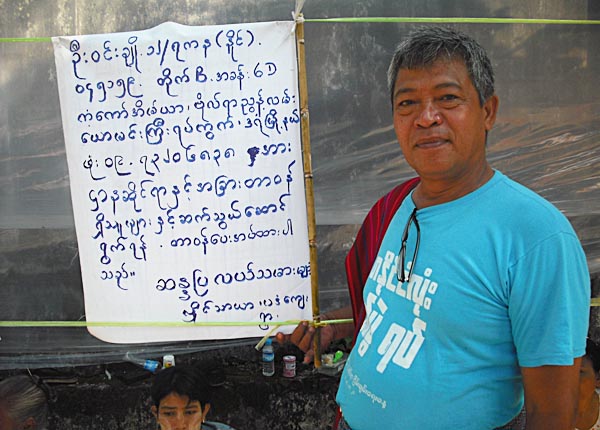Two well-known activists have been sentenced to three months in prison for violating Burma’s controversial Right to Peaceful Assembly and Peaceful Procession Act, after staging a rally without prior permission from local authorities.
Win Cho and Wai Lu, who have both faced multiple charges and prison terms under the controversial statute, were convicted of organising an unlawful demonstration on 26 March 2014 against a sudden electricity price hike in Rangoon.
The ruling was handed down by Rangoon’s Kyauktada Township court on Monday, according to their lawyer, Robert San Aung.
Win Cho, a prolific community organiser and member of the Myanmar Social Development Network, has been charged dozens of times for his role in protests over land rights, economic hardship and other causes common across Burma.
Shortly after the energy price demonstration in March, Win Cho was jailed for his involvement in an unrelated protest two months earlier, when he was joined by hundreds of farmers demanding constitutional reform and the establishment of a farmers’ union. He and fellow activist Nay Myo Zin were swiftly jailed, serving a total of 84 days in Insein Prison.
The two were released on 25 June after serving out their full three-month sentences.
Wai Lu, the other activist sentenced on Monday, was hit with an additional one-month sentence for his role in another demonstration over the eviction of central Burma’s Moehti Moemi gold miners. The small-scale mine operators lost their jobs and homes when the government granted a mining concession to a major conglomerate in June 2012.
[related]
After the work freeze, more than 100 displaced miners sought refuge in a nearby monastery where they faced a series of eviction threats and were subject to an early-morning raid in March at which about 50 people were arrested.
Monday’s sentencing was the latest in a long string of jail terms for peaceful protestors since the reform process began. The country’s assembly laws have been oft-criticised for granting sweeping powers to authorities to arbitrarily detain activists.
Among the most contentious edicts is part of Section 18 (often mislabelled as “Article 18”) of the Right to Peaceful Assembly and Peaceful Procession Act, as it requires the permission of local authorities for all public gatherings. Claims abound that permission is discriminately denied under the broad terms outlined in the law.
Amendments made to Section 18 earlier this year have been called a “disappointment” by rights monitors, who argue that while the changes reduce sentences, the legislation still endangers the principle of freedom to assemble, which is enshrined in Article 534(b) of Burma’s Constitution.



